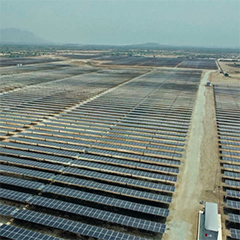Solar tracker supplier adds value with engineering services, software and construction leadership
The year 2019 saw rapid growth in the solar PV tracker market, with most vendors doubling or at least significantly expanding their shipments from the previous year. Much of that activity was in the US, which represented 50% of global tracker sales and expanded its production by over 200%.
Part of the reason for that growth was the US policy environment. In a process called ‘safe harbor,’ solar developers were scrambling to ensure that they could either purchase components or start their projects before the end of the year in order to be eligible for the 30% Investment Tax Credit, which is now gradually declining each year. However, safe harbor was only responsible for 30-40% of the market expansion, according to Renewable Energy World.
The rest is due to recognition of the superior efficiency of tracking systems, which can increase solar production by 15-25% under the right conditions. As the utility-scale solar sector continues to lead the renewable energy industry in growth worldwide, investors are looking for every opportunity to maximize energy production and return on investment.
FTC Solar is no exception to booming growth rates for tracker sales in 2019. After launching our business in 2017, we contracted over 500MW in 2019, the first full year of deployment for the company’s new Voyager tracker, and have over 1.5 GW contracted for 2020. Most of those systems were installed in the US, and we are now on track to expand internationally.
Looking ahead to 2020 results, utility-scale solar is expected to maintain its rapid growth, possibly even reaching record installations, despite the coronavirus pandemic. While distributed generation markets could lose close to 30% of their expected growth in 2020, according to the Solar Energy Industries Association, the utility-scale sector has 51 GW of contracted solar still in the pipeline, and that should help it maintain momentum.
Solar tracker supplier adds value with engineering services, software and construction leadership
The year 2019 saw rapid growth in the solar PV tracker market, with most vendors doubling or at least significantly expanding their shipments from the previous year. Much of that activity was in the US, which represented 50% of global tracker sales and expanded its production by over 200%.
Part of the reason for that growth was the US policy environment. In a process called ‘safe harbor,’ solar developers were scrambling to ensure that they could either purchase components or start their projects before the end of the year in order to be eligible for the 30% Investment Tax Credit, which is now gradually declining each year. However, safe harbor was only responsible for 30-40% of the market expansion, according to Renewable Energy World.
The rest is due to recognition of the superior efficiency of tracking systems, which can increase solar production by 15-25% under the right conditions. As the utility-scale solar sector continues to lead the renewable energy industry in growth worldwide, investors are looking for every opportunity to maximize energy production and return on investment.
FTC Solar is no exception to booming growth rates for tracker sales in 2019. After launching our business in 2017, we contracted over 500MW in 2019, the first full year of deployment for the company’s new Voyager tracker, and have over 1.5 GW contracted for 2020. Most of those systems were installed in the US, and we are now on track to expand internationally.
Looking ahead to 2020 results, utility-scale solar is expected to maintain its rapid growth, possibly even reaching record installations, despite the coronavirus pandemic. While distributed generation markets could lose close to 30% of their expected growth in 2020, according to the Solar Energy Industries Association, the utility-scale sector has 51 GW of contracted solar still in the pipeline, and that should help it maintain momentum.
To read the full content,
please download the PDF below.


























